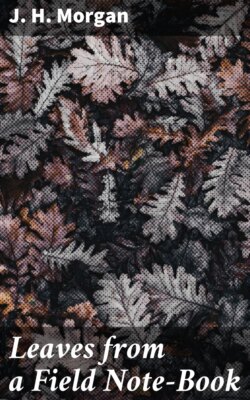Читать книгу Leaves from a Field Note-Book - J. H. Morgan - Страница 3
На сайте Литреса книга снята с продажи.
PREFACE
ОглавлениеTable of Contents
This book is an unofficial outcome of the writer's experiences during the five months he was attached to the General Headquarters Staff as Home Office Commissioner with the British Expeditionary Force. His official duties during that period involved daily visits to the headquarters of almost every Corps, Division, and Brigade in the Field, and took him on one or two occasions to the batteries and into the trenches. They necessarily involved a familiar and domestic acquaintance with the work of two of the great departments of the Staff at G.H.Q. So much of these experiences of the work of the Staff and of the life of the Army in the field as it appears discreet to record is here set down. The writer desires to express his acknowledgments to his friends, Major E.A. Wallinger, Major F.C.T. Ewald, D.S.O., and Captain W.A. Wallinger, for their kindness in reading the proofs of some one or more of the chapters in this book. Nor would his acknowledgments be complete without some word of thanks to that brilliant soldier, Colonel E.D. Swinton, D.S.O., with whom he was closely associated during the discharge of the official duties at G.H.Q. of which this book is the unofficial outcome. Most of these chapters originally appeared in the pages of the Nineteenth Century and After, under the title to which the book owes its name, and the writer desires to express his obligations to the Editor, Mr. Wray Skilbeck, for his kind permission to republish them. Similar acknowledgments are due to the Editor of Blackwood's Magazine for permission to reprint the short story, "Stokes's Act," and to the Editor of the Westminster Gazette in whose hospitable pages some of the shorter sketches appeared—sometimes anonymously.
The reader will observe that many of these sketches appear in the form of what, to borrow a French term, is called the conte. The writer has adopted that form of literary expression as the most efficacious way of suppressing his own personality; the obtrusion of which, in the form of "Reminiscences," would, he feels, be altogether disproportionate and impertinent in view of the magnitude and poignancy of the great events amid which it was his privilege to live and move. Moreover, his own duties were neither spirited nor glorious. But the characters pourtrayed and the events narrated in these pages are true in substance and in fact. The writer has not had the will, even if he had had the power, to "improve" the occasions; the reality was too poignant for that. "Stokes's Act" and "The Coming of the Hun" are therefore "true" stories—using truth in the sense of veracity not value—and the facts came within the writer's own investigation. The investiture of fiction has been here adopted for the obvious reason that neither of the principal characters in these two stories would desire his name to be known. So, too, in the other sketches, although the characters are "real"—I can only hope that they will be half as real to the reader as they were and are to me—the names are assumed.
It is my privilege to inscribe this little book to Lieut.-General Sir C.F.N. Macready, K.C.B., K.C.M.G., to whose staff I was attached and to whose friendship, encouragement, and hospitality I owe a debt which no words can discharge.
J. H. M.
January 1916.
